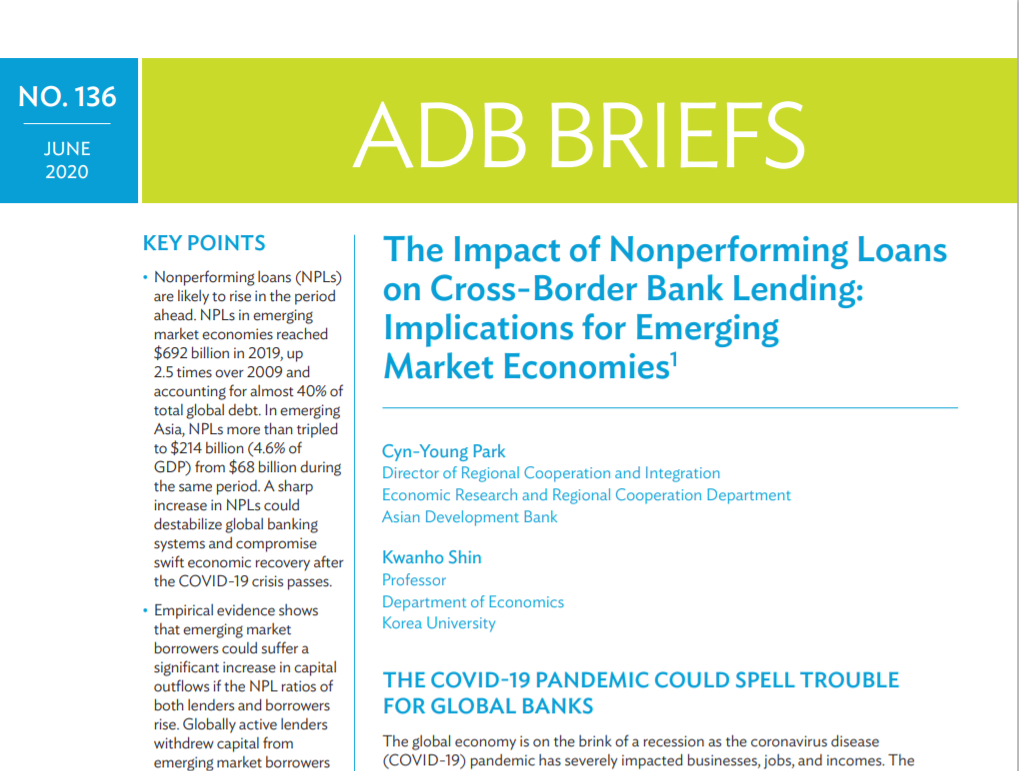
- Details
"ADB has published a new article The global economy is on the brink of a recession as the coronavirus disease (COVID-19) pandemic has severely impacted businesses, jobs, and incomes. The pandemic-induced economic slowdown is driven by both the supply and demand sides of the economy. As many economies have imposed lockdown measures, factories have been closed, supply chains disrupted, and productivity has fallen, with mounting economic losses.

- Details
EBRD has published a new working paper on COVID-related impact.
"What will be political legacy of the Coronavirus pandemic? We find that epidemic exposure in what psychologists refer to as an individual’s “impressionable years” (ages 18 to 25) has a persistent negative effect on confidence in political institutions and leaders.

- Details
New IMF publication brings together six prominent thinkers to reflect on how the pandemic has changed the world.

- Details
New ADB blog has been recently published on Fintech.
"Fintech – the fusion of finance and technology – could be a game-changer for inclusive economic growth amidst the pandemic.
Read more … Fintech is emerging as a driver of innovative financial solutions during COVID-19

- Details
New ADB blog on how bussinesses and their workers can be supported in crisis times.
"Many workers will be displaced and many businesses will close as a result of the slowdown caused by COVID-19. Providing support to those affected gives them a fighting chance.
Read more … Three ways to support businesses and their workers during a pandemic

- Details
IMF published a new blog, which is part of a special series on the response to the coronavirus.

- Details
"The coronavirus (COVID-19) pandemic is having a profound and deeply damaging impact on the countries where the EBRD works, posing enormous challenges for policymakers across all our regions.

- Details
"The international statistics community has continued to work together, in partnership with national statistical offices and systems around the world, to ensure that the best quality data and statistics are available to support decision making during and after the current crisis. In this context, thirty six international organizations have launched, under the aegis of the Committee for the Coordination of Statistical Activities (CCSA), a report entitled “How COVID-19 is changing the world: a statistical perspective”.
Read more … How COVID-19 is changing the world: a statistical perspective (UN)

- Details
"Driving at work is something that we do without fully appreciating the risks. Road traffic crashes are among the leading causes of death for the working-age population worldwide and for many people driving is the most dangerous aspect of their work." This can also apply to financial institutions and their employees while driving for client visits or regular commuting between home and office.
The EBRD supported the development of a special road safety toolkit for all who drive and manage vehicle fleets to help mitigate risks in that field.
This is a free-access e-learning course designed by a team of international experts. Sign up at http://www.roadrisktoolkit.com to access training and resources to keep yourself safe.

- Details
The coronavirus pandemic is posing a grave threat to small and growing businesses around the world. Women entrepreneurs make vital contributions to their local economies and are particularly vulnerable to the economic effects of the pandemic.
Financial institutions responding to the COVID-19 crisis?
Read more … Why gender matters? Financial institutions responding to the COVID-19 crisis

- Details
“Will the coronavirus pandemic change capitalism forever? Could such changes lead to economies and societies which are more cohesive, inclusive and fairer than those of the recent past?

- Details
EBRD published a new episode of its Pocket Dilemmas podcast on “What does the coronavirus pandemic mean for gender inequality?”. Guest speakers and presenters discuss the effects of the pandemic on women and men.
The podcast can be accessed in English via the following link.
Image: EBRD. Pocket Dilemmas


